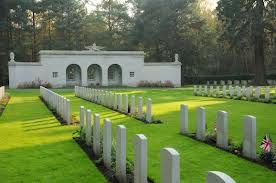 |
| Cast of Blackadder goes Forth http://en.wikipedia.org/wiki/Blackadder_Goes_Forth |
I remember vividly being shown a clip of Blackadder at the
end of a history class where the focus had been on WWI, but it was never used
as the centre piece of the lesson and I can’t say that I based my entire
understanding of WW1 on the message of that piece. In fact I think it was one
of those cases where a video was shown as a reward for finishing a given piece
of work early. It was also just one of a number of other teaching tools that were
used to teach us about WW1, we were also shown primary source material (including
propaganda) and taken to Brookwood Cemetery – what political meaning should I ascribe
to that?
 |
| Brookwood Cemetery http://www.cwgc.org/ |
 |
| WW1 Poster http://www.telegraph.co.uk/news/picturegalleries/uknews/3400728 |
I remember in another class being asked to debate the reputation
of General Haig, having been given a mixture of sources that portrayed him as both
an army general doing his job and others where he was portrayed as the ‘butcher
of the Somme’. I know now what a controversial figure he was because of that
particular lesson and also now realise, that at that point I was also being
introduced to the idea of historiography and the continually evolving nature of
historical interpretation. At 14 years old we were being given material and
encouraged to draw out own arguments and as such I never saw WW1 as a narrow
and straight forward conflict and have always had great respect for those who
fought for this country.
That might have been down to the initiative of our teacher I don’t know, but I would say is that those lessons gave me a really good grounding for understanding WW1 and one that was based on more than just the idea of ‘lions led by donkeys’. I can't help but feel this debate has lost some perspective and become more about political agenda than education. As with most of history WW1 is the subject of multiple interpretations - who's to say which are right and which are wrong? Should we not be more concerned with presenting as many of those perspectives as we can and hoping that one or more may provoke an enquiring mind?
That might have been down to the initiative of our teacher I don’t know, but I would say is that those lessons gave me a really good grounding for understanding WW1 and one that was based on more than just the idea of ‘lions led by donkeys’. I can't help but feel this debate has lost some perspective and become more about political agenda than education. As with most of history WW1 is the subject of multiple interpretations - who's to say which are right and which are wrong? Should we not be more concerned with presenting as many of those perspectives as we can and hoping that one or more may provoke an enquiring mind?
No comments:
Post a Comment